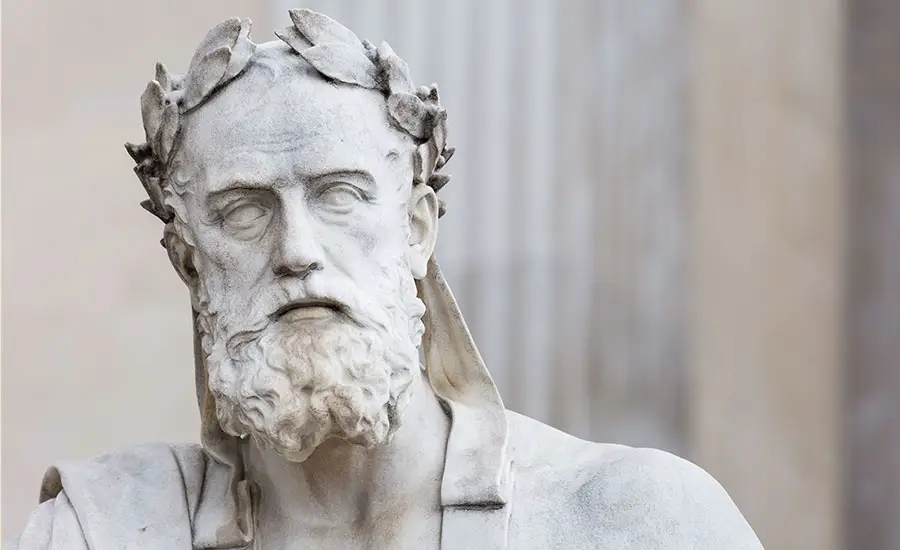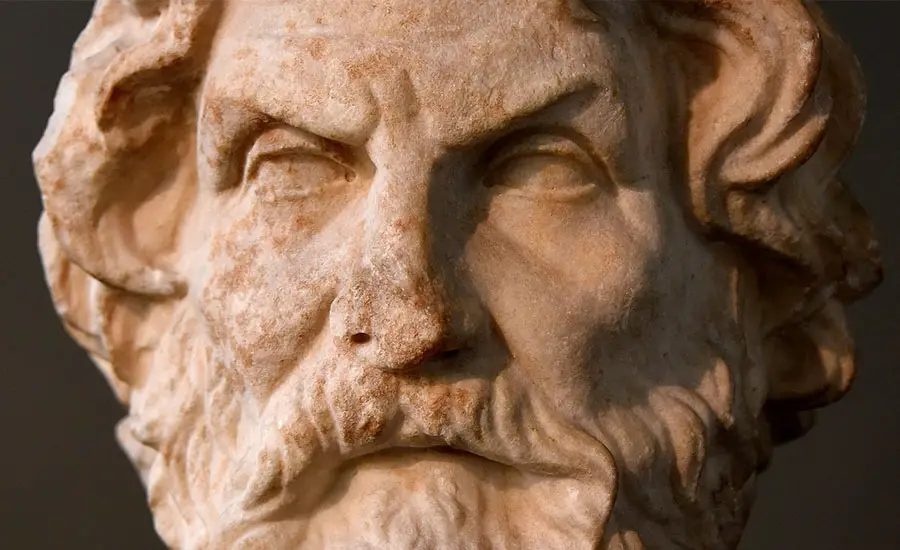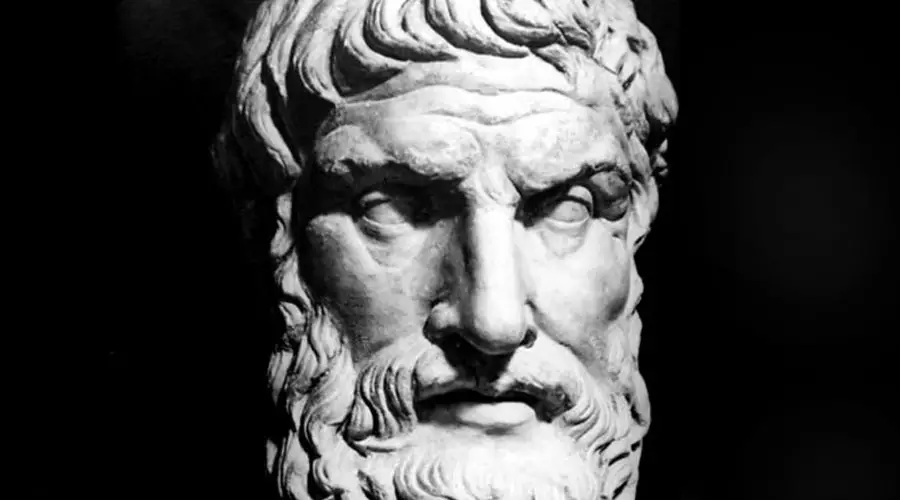For a period of several hundred years, starting in the 6th century BC, ancient Greece saw an incredible flourishing of human discover and knowledge occurred in ancient Greece. Still regarded as the greatest philosophers to ever live, the scholars of this time dedicated their lives to expanding awareness on topics such as logic, virtue, reason, science, and more.
Ancient Greece was home to several generations of philosophical schools, each with distinct contributions to philosophy. Beginning with Pythagoras in the 500s BC, who focused on math, and then later Socrates, followed by Plato and Aristotle. Following generations included the Cynics, Skeptics, and Stoics, each with very different ideas.
There is great overlap in the doctrines of the different schools, but each was unique in its own way as well. In this article we are going to take a look at each of the most important philosophical schools of Ancient Greece.
The Pythagorean School
Pythagoras of Samos, who lived from 580 BC – 500 BC founded the Pythagorean school. According to him, mathematics is the most sacred and exact of all sciences. A group of distinguished philosophers belonged to this school, and they studied arithmetic, music, astronomy, and geometry. This school was one of the first to develop a community in which its members would assist each other in obtaining knowledge. Pythagoreanism is essentially a system of metaphysics which focuses upon numbers. They developed the theory of celestial harmonics, or “music of the spheres”. They placed great importance on the discipline of silence, since in moments of silence they could achieve their greatest contemplation.
Pythagoras was the son of a wealthy merchant and received a good education. Despite being such a towering figure in philosophy none of his writings, if he did even write any, have survived. What is known about him and his philosophy have been written by others. He is remembered as a powerful and charismatic public speaker, a pacifist, and a vegetarian who practiced celibacy to maintain spiritual power and clarity of thought. He was highly secretive, and probably studied in Egypt. His doctrine describes a 3000-year cycle of soul, in which it incarnates as a human, and then it enters the body of a dry land animal, then a sea animal, then a flying animal, and then back to being human. According to him, everything happens in cycles and nothing is new. He advocated virtuous, humane behaviour, and especially the truth of mathematics. Everything is number and math is a path to enlightenment. He is perhaps best known for the Pythagorean Theorem, a concept in math that shows that when a triangle has a right angle, and the sides of the triangle are made into squares, then the largest square is the same size as the other two squares put together.

What did the Pythagorean school contribute to philosophy?
Immortality and reincarnation of the soul, virtuous and good treatment of all living things, and the recognition of mathematics as being the way to objectively perceive ultimate truth.
The Eleatic Sect
Founded by Xenophanes who lived from 570 BC – 480 BC, who was a vocal critic of the cosmology of Homer and Hesiod. According to Xenophanes God is “one and incorporeal, in substance and figure round, in no way resembling man; that He is all sigh and all hearing, but breathes not; that He is all things, the mind and wisdom, not generate but eternal, impassable, immutable, and rational”. According to his philosophy all things are eternal, and the world is without beginning or end.
Another member of the Eleatic sect named Parmenides, a student of Xenophanes, also rose to prominence. His ideas differed from his teacher in some ways, and he declared that the senses are uncertain, and only through reason can truth be ascertained. He also asserted that the earth is round.
Another member named Melissus, who held many similar views as Parmenides developed the concept that the universe is immovable because it occupies all space and therefore there is no space for which it can be moved. Him and others rejected the idea of there being a vacuum in space, and he declared that there is only one god, an eternal being. Meanwhile other members of the Eleatic sect conceived that Deity is spherical in shape, and that the universe consists of two parts: atoms and vacuum. Both are infinite, atoms in number, and vacuum in magnitude, and that everything is made of these two things. Atoms have two properties, form and size. The soul consists of atoms, and can dissolved like the body. The mind is made of spiritual atoms.

What did the Eleatic sect contribute to philosophy?
The criticism of the pantheon of gods, the concept of the oneness of all things, and the elevation of reason and logic above sensory experience.
The Socratic Sect
This group was created by Socrates, who lived from 469 – 399 B.C. His approach was skeptical, and therefore he did not impose his beliefs upon others, but rather sought to inspire inquisitiveness through questioning. He encouraged his students to develop their own theories. He proposed that the soul exists before the body, and prior to incarnation in physical form it possesses all knowledge, but as it becomes immersed into the physical form of the body it forgets. Through our life experiences we reawaken and recover the knowledge our soul originally possessed. He declared his philosophy to be the way of happiness with a two-fold purpose: (1) to contemplate God, and (2), to abstract soul from corporeal sense.
Socrates proposed that the principles of all things are three in number: God, matter, and ideas. About God he said: “What He is I know not; what He is not I know.” He defined matter as being what generates and corrupts, while ideas are incorruptible, and the intellect of God.
Socrates lived in Athens and served as a solider in his youth. His style of teaching became known as the Socratic method, in which rather than passing on knowledge to his listeners he would question his students so that they would arrive upon their own clarified understanding.
Did not write, but was a powerful speaker and produced much of his philosophy while engaged in dialogue in others. He was critical of the idea of democracy, and focused much of his philosophy on ethics. He was controversial in his own time, choosing to go unwashed, barefoot and with long hair, and was mocked in the public eye as a character in a play called “Clouds” by Aristophanes. He was killed at age 70 from being poisoned by hemlock, after being put on trial on a charge of impiety, or corrupting the youth.
Much of what is known about Socrates comes from the writing of Plato, as Socrates appears in much of Plato’s writings, although there is debate about whether Plato was capturing the original ideas of Socrates, or using his name as a literally figure to share Plato’s own ideas.

What did the Socratic sect contribute to philosophy?
The dialectic method of inquiry, known as the Socratic Method, in particular applied to questions of morality.
The Elean Sect
This group was founded by Phædo of Elis, a devoted disciple of Socrates who as a boy had been captured in war and sold into slavery, before being founded and freed by his famous mentor. Phædo was also greatly admired by Plato, who named a discourse after him. The Elean sect which he founded eventually became known as the Eretrian sect as it continued to function for multiple generations of philosophers, although little is known of the group’s doctrines.

What did the Elean sect contribute to philosophy?
It is not known. None of their writings have been preserved.
The Megarian sect
This group was founded by Euclid of Megara (unknown – 374 B.C), who was deeply influenced by Socrates and had to go to incredible lengths to learn from his master. Athens forbid people of Megara from entering their city, upon punishment of death, so Euclid would disguise himself as a woman and go to Athens at night to study with Socrates. When Socrates was killed, his students, who felt that they could suffer a similar fate, fled to Megara, where they were received with great honor by Euclid. The Megarian sect accepted the Socratic doctrine that virtue is wisdom, and also added to it their new concept that goodness is absolute unity and all change is an illusion of the senses. Euclid proposed that there is no opposite to good, and that evil does not exist.

What did the Megarian sect contribute to philosophy?
A fusion of Eleatic and Socratic thought, that the opposite of good does not exist, and that good is one. They possessed highly developed dialectical skills, and specialized in the logic of whole propositions.
The Cynics
The Cynics were a sect founded by Antisthenes of Athens (444-365 B.C) who was a disciple of Socrates. Their doctrine was extremely individualistic, and stated that human existence is all about suffering, and that by immersing ourselves in disharmony we may find our own true inner nature. They renounced worldly possessions, living with the most basic food and shelter possible. In their view the gods wanted nothing, and therefore those who lived with the least amount of want were most like the gods.

What did the Cynics contribute to philosophy?
That the purpose of life is to live a life of virtue in in harmony with nature, which involves a minimalist lifestyle of basic consumption. They are sometimes credited with creating cosmopolitanism, as they considered themselves citizens of the world rather than only representing their local region.
The Cyrenaic Sect
Founded by Aristippus of Cyrene (435-356 B.C), this sect advocated the doctrine of hedonism. As a young man Aristippus traveled to study with Socrates, but the elder legendary philosopher was never able to change Aristippus’s view that life was all about pleasure. The Cyrenaic’s doctrine stated that everything we know about anything is only through our senses of it, and the reaction it stirs in us. Therefore, that which produces the most pleasant feeling is considered the greatest good. Pleasure is the reason for existence, and only experienced in the present moment. They considered grief to be the harshest of all emotions, and a disease to be avoided. They sought to be free of love or superstition, and devoted their time to indulgence.

What did the Cyrenaic sect contribute to philosophy?
As hedonists they declared that pleasure was the supreme good life. They considered physical pleasure to be more intense than mental pleasure and therefore more desirable. They considered pain to be the only evil.
The Academic Philosophers
The Academy was found by Plato in 385 B.C who presided over until his death. Located in a park in Athens, it continued to operate until 529 A.D when it was considered a threat to Christianity and shut down by Roman Emperor Justinian. Its curriculum included philosophy, astronomy, biology, math, and politics.
Plato travelled extensively during his life and was initiated by the Egyptians into Hermetic philosophy. As a young man he met Socrates and became a devoted student. He also lived through the Peloponnesian War between Athens and Sparta, serving as a soldier during this time, and experienced the victory by Sparta converting Athens from a democracy into an oligarchy.
Much of Plato’s philosophy was also influenced by the Pythagoreans, and includes ethics, physics, and dialectics. His doctrine concerned itself with the nature of good, stating that good in the soul is expressed through virtues, good in the body is expressed in symmetry, and good in the external world is expressed through friendship. Plato uses the term the One to describe the absolute, which suggests that everything is merely parts of the whole, and everything is united. Like the Socratic sect, the Academic philosophers considered learning to actually be remembering what the soul already knew in a previous existence.

After the death of Socrates, Plato travelled for 12 years, studying math, geometry, geology, astronomy, and religion. During this time, he began writing, initially conveying the philosophies of Socrates. He then turned his focus to themes of justice and wisdom, producing his famous The Republic, which explored the concept of a benevolent government run by philosopher kings. His later writings took on a more metaphysical theme, as well as explores many art forms, including dance, music, and architecture. In 363 B.C. Plato wrote two Socratic dialogues called Timaeus and Critias in which he described the lost civilization of Atlantis. You can read about his description of Atlantis here.
Plato spent the final years of his life at the Academy working on his writing, and dies in his 80s. After Plato’s death, his disciples split into two groups. The Academics continued to meet in the academy he created, while the other group, the Peripatetics branched off to form a separate organization.
What did the Academic Philosophers contribute to philosophy?
Their ideas (Plato’s in particular) are considered to be the foundation of western thought. Plato’s contributions include the theory of Forms, which says that non-physical forms, or ideas, are more ideal than the physical world, which are an imperfection expression of the ideal, which only exists in an abstract sense.
The Peripatetics
The Peripatetics were led by Aristotle (384-322 B.C), who had been Plato’s greatest disciple after joining the Academy at age 17. The name of the group comes from the fact that Aristotle liked to walk as he was teaching, and his students had to follow him if they wanted to learn, so Peripatetics means “people who travel about”. Aristotle was renowned for his knowledge of every area human knowledge, including all of the sciences, and his intelligence was recognized by Plato and others as being without equal. Because of philosophical differences between him and Plato, rather than becoming the director of the Academy after Plato’s death, he formed his own new school, called the Lyceum.
Aristotle saw philosophy as having both practical and theoretical aspects. He sought moral perfection through virtue, as his philosophy included ethics and politics, as well as contemplative system of physics and logic that encompassed all things.
His philosophy can be divided into 4 areas: dialectics, physics, ethics, and metaphysics. In his book Metaphysics, he described the difference between matter and form, with matter being the physical substance of things, and form being the unique nature of things that give them their identities. In Politics, he describes the function government should have in the pursuit of virtue. He wrote many other books on subjects ranging from law, logic, and science.

Aristotle was the tutor of Alexander the Great starting when the great military leader was aged 13. Alexander was the son of King Philip II of Macedonia, and Aristotle’s father had been the royal families’ physician. The connection with the Macedonian court was one that Aristotle maintained his entire life.
When Alexander died, Aristotle was forced to flee Athens to avoid execution since the pro-Macedonian government was overthrown. He Relocated to an island called Euboea, and died a year later.
What did the Peripatetics contribute to philosophy?
They made significant contributions in biology and physics, and invented much of the way science investigates nature to this day. They also innovated in logics, criticism, rhetoric, ethics, and politics.
The Skeptics
Skepticism as described by Pyrrho of Elis (365-275 B.C) is characterized by seeking without claiming to have found truth. This is the opposite of dogmatists, which are those who claim they have found truth. They regarded accepted theories as being indemonstrable, and absolute knowledge to be impossible to obtain. The first Skeptic school started in Plato’s Academy, and was known as Academic Skepticism.

What did the Skeptics contribute to philosophy?
Beginning from the perspective of Socrates, they laid out the argument that nothing could truly be known, and that there is not criteria that can distinguish true from false.
The Stoics
The Stoics were founded in by Zeno (340-265 B.C), who had been a student of Crates the Cynic before forming his own movement. Stoic philosophy focuses on the materialistic world, natural law, and the recognition of good and evil as being necessary counter balances to each other. Their doctrine does not include the concept of immortality, and the soul is the body, which consists of eight parts: the five senses, the generative power, the vocal power, and an eighth hegemonic part. The Greek Stoics were followed by the Roman Stoics Epictetus, and Marcus Aurelius.

What did the Stoics contribute to philosophy?
That life is meant to be active, and we must participate in politics, be social and contribute to our community. Also, that we must not succumb to the stresses of life, remaining vigilant by maximizing positive emotions, and reducing negative ones.
The Epicurean sect
Founded by Samos (341-270 B.C), the Epicureans saw pleasure as being the most desirable state, however rather than through indulgence they sought pleasure by renouncing the mental and emotional processes which produce pain and sorrow. In the philosophy of Epicurus, just as the pains of the mind are greater than that of the body, so too are pleasures of the mind greater than that of the body. They considered the perceptions of the senses to be absolute truth.

What did the Epicurean sect contribute to philosophy?
That pleasure is the chief good in life, and that we should life in a way that we can experience as much pleasure as possible, but do so moderately so as to avoid the pain that goes with overindulgence.
Eclecticism
Eclecticism is the practice of selecting different doctrines, at times even contradictory ones, and blending them together to form a new composite doctrine. At times criticized for lacking logic, eclecticism has been considered the philosophy of the laymen. Most of the philosophers of the Roman empire fall into this category. Cicero is an example of this sort of philosophy, as he blended many ideas from the earlier Greeks into his writings.
What did Eclecticism contribute to philosophy?
That multiple philosophies and texts can be combines with their own life experiences and philosophical ideas to create new models and systems of philosophical thought.
The Neo-Pythagorean School
This movement arose in Alexandria during the beginning of the Christian era. While the Pythagorean school had been extinct since the 4th century B.C A revival of Pythagoreanism occurred. It was eclectic in nature since it blended Pythagorean ideas with many others. The most famous philosophers from this era are Apollonius, and Moderatus.
What did the Neo-Pythagorean school contribute to philosophy?
It blended Platonism with Paganism, fusing the thoughts of Plato and Pythagoras with the metaphysics and ritual of Paganism. In particular numerology was heavily explored.
Recommended Reading
If you want to continue exploring ancient Greece and philosophy more deeply, you can see which books I recommend by clicking here.

